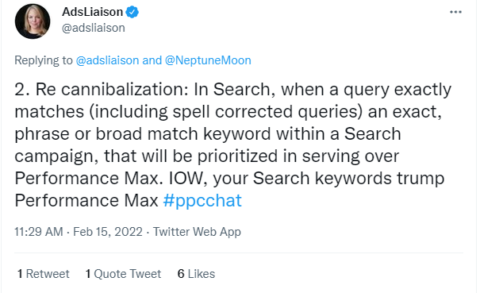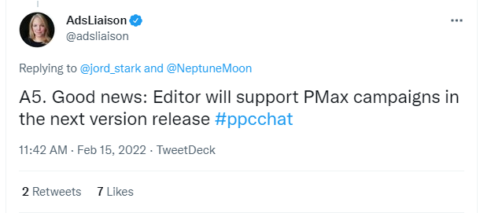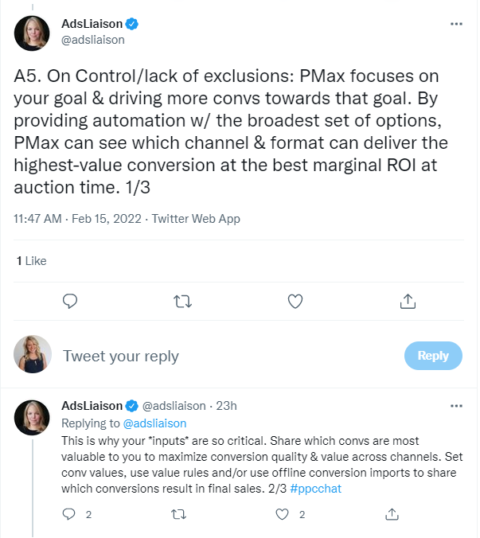Every week, digital advertisers far and wide come together on Twitter to discuss relevant PPC topics. This week’s topic was all about Google’s new Performance Max campaign type.
A recap of the discussion is below, highlighting recent successes and pitfalls from advertisers.
As a special feature, PPC Chat hosted the official Ads Liaison, Ginny Marvin of Google.
Question 1: Are You Running Performance Max Campaigns?
This question was met by mostly “yes” by advertisers in the chat. However, it appears that brands in the B2B space are not using them due to lack of good use cases.
Gabriele Benedetti offered commentary that while he testing Performance Max campaigns, this campaign type requires a different approach to Google Ads management.
 Image credit: Screenshot taken from author, February 2022
Image credit: Screenshot taken from author, February 2022Question 2: If You Haven’t Run Any Yet, Why Not?
This question in particular got more honest feedback from advertisers. The main reasons marketers aren’t using Performance Max campaigns include:
- Lead generation clients don’t see value in them.
- This campaign type seems to provide a similar approach to other platforms, such as Facebook.
- Not enough control for enterprise clients.
Julia Vyse mentions that her reasoning is due to omni channel marketing strategy.
 Image credit: Screenshot taken by author, February 2022
Image credit: Screenshot taken by author, February 2022Question 3: How Has The Performance Of Performance Max Campaigns Been?
This question showed a mix of volatile results, from “dreadful” to “surprisingly well. A few of the main responses included:
- Performance Max ends up cannibalizing other, higher-performing individual channels.
- Seems to be working well for ecommerce clients, especially for campaigns that hadn’t performed well in shopping.
- Many say it’s too early to tell and difficult to determine because of the cannibalization of other campaigns.
There were many concerns brought up about cannibalization and lack of exclusions for campaigns.
Marvin was able to address concerns and brought clarification and hope to advertisers.
Regarding exclusions, Marvin confirmed the following:
- Content exclusions are already available.
- Google will be introducing keyword exclusions at the account level (TBD) to address brand safety concerns.
Regarding cannibalization, Marvin clarified Google’s prioritization, summarized here:
 Image credit: Screenshot taken by author, February 2022
Image credit: Screenshot taken by author, February 2022Basically, in theory, your existing Search campaigns should be prioritized over Performance Max campaigns if a query exactly matches an Exact, Phrase, or Broad keyword within your existing campaigns.
Question 4: What’s Your Biggest Challenge With Performance Max Campaigns?
The responses were overwhelmingly similar from everyone. Advertisers didn’t hold back on their riffs with this particular campaign type. The main challenges for marketers summed up are:
- Cannibalization
- Managing the automation (lack of control + exclusions)
- Death of reporting (lack of data, no placement reporting, etc.)
- Google automatically creates video assets for you (most people don’t like that)
This question was then led by a similar question:
Question 5: Is There Anything You Wish Were Different About Performance Max Campaigns?
This question brought a lot of great feedback and discussion to the table. The main asks for Performance Max campaigns include:
- Ability to build in Google Ads Editor
- Campaign level keyword exclusion, placement exclusion, device modifier, targeting
- Being able to test without all available assets (video)
- Reporting
Marvin was able to provide valuable feedback and answers to advertisers’ wish list.
First, Marvin confirmed the support of Performance Max in Google Ads Editor:
 Image credit: Screenshot taken by author, February 2022
Image credit: Screenshot taken by author, February 2022Next, Marvin addressed the reporting and control (or lack of) for campaigns.
 Image credit: Screenshot taken by author, February 2022
Image credit: Screenshot taken by author, February 2022Regarding the control for campaigns, Marvin emphasizes how critical your inputs are when creating these campaigns. For example, if you don’t specify which conversions matter the most, you may end up with a lot of conversions that don’t matter as much as your core conversions.
If your main goal is ecommerce purchases, but you also have a secondary conversion of email signups, make sure you prioritize and specify which matter the most. The campaign success will be directly attributed to how thoughtful you are in building the campaign structure.
Summary
Performance Max campaigns have a long ways to go. Not only in the performance itself, but the trust that lies within advertisers to use them.
Google is actively listening to feedback from advertisers and has provided some hope for the future of this campaign type.
Source: Twitter
Featured Image: TarikVision/Shutterstock
